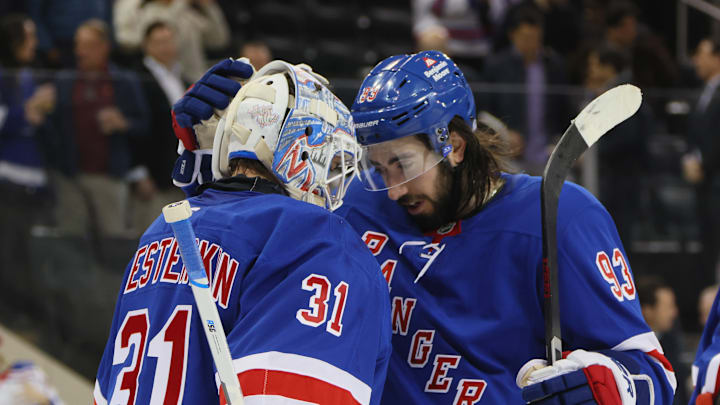Despite lofty expectations and a "run-it-back" approach to roster building, the 2024–25 New York Rangers failed to replicate their previous season's success. Defensive instability, a broken power play, and underwhelming top-line production all contributed to a campaign that never found its rhythm. While goaltending remained a relative strength, it wasn’t enough to salvage what became a deeply frustrating season for fans and players alike. Before we talk about this season, I feel like it’s only appropriate to make an example of what a good grade would be.
The 2023–24 New York Rangers
Grade: A
While the team didn’t secure the ultimate accomplishment that we could all agree would lend itself to an A+, the group succeeded more than most would have expected, finishing first overall in league standings. They swept the opening round of the playoffs for the first time since 2007 and enjoyed a lengthy postseason run that ultimately ran out of steam, losing to the eventual winners, the Florida Panthers.
The 2024–25 New York Rangers
Grade: D-

After a short offseason, Rangers management made a call that many teams likely would have after their best statistical season—run it back, baby! The only notable change was swapping out Barclay Goodrow for Reilly Smith, which, at the time, seemed like it would help the team on paper. Once the season began, the team enjoyed its fourth-best start since ’94, going 12-4-1 in their first 17 games. Then things turned ugly: a five-game losing streak set off a palpable panic within both the organization and the fan base.
The Defense
Grade: D
It’s hard to give a passing grade to a group that had to be patched together on the fly and never completely found its footing. Rangers President of Hockey Operations and General Manager Chris Drury essentially remodeled the entire defensive unit mid-season. Calvin de Haan replaced Ryan Lindgren, Kaapo Kakko was traded for Will Borgen, and Jacob Trouba became Urho Vaakanainen. Carson Soucy was also brought in for a draft pick, and suddenly, it was a very different blue line than the one originally envisioned.
Adam Fox had another strong showing, though he caught some flak for his lackluster 4 Nations performance. Judging solely by his time in a Rangers uniform, he was once again—unsurprisingly—the team’s best defenseman. Will Borgen played well enough to earn himself a nice contract extension, but his play dipped almost immediately after signing. The same could be said for Vaakanainen, and de Haan ended up appearing in just three games.
The Offense
Grade: C-
It might come as a surprise, but the Rangers actually scored more goals than the Florida Panthers and New Jersey Devils, both of whom are now in playoff position. The team also led the league in shorthanded goals by a healthy margin, with 18—six more than the Panthers.
Unfortunately, every player in the top six saw a drop in point production compared to the previous season, falling well below expectations. One bright spot, however, was the return of former Ranger J.T. Miller. His addition jump-started players like Mika Zibanejad and Artemi Panarin, with the trio averaging more than a point per game after the trade.
The Power Play
Grade: F
This was one of the truly horrible parts of the Rangers' season. What was once a superpower became their greatest weakness. Not only did the Rangers look lost on the man advantage, but they also scored more shorthanded goals in the final 20 games than power-play goals.
The team converted just 17.6% of their opportunities—their lowest rate in a decade and fifth-worst in the league. For context, this was the third-best power play in the NHL just a season ago. Even more frustrating, the Blueshirts had the fourth-most power-play opportunities in the league, yet they failed to weaponize it like they once did.
Peter Laviolette
Grade: D-

Following just a two-year stint in New York, the Rangers have officially moved on from head coach Peter Laviolette. This shouldn’t come as a surprise to most Rangers fans—particularly after the late-season stretch, which included questionable decisions like benching top rookies Gabe Perreault and Brennan Othmann.
The only reason this doesn’t get a flat-out F, in my opinion, is because Laviolette genuinely seemed committed to finding the right line combinations and was willing to experiment. Who can really blame him for riding with someone like Berard after a two-goal night during the Gabe fiasco? Why not keep Miller with Mika, who showed instant chemistry following the trade? Though I didn’t agree with the majority of his decisions, even a broken clock is right twice a day.

Ultimately, the team finds itself in a very different place at the close of the season than where it began. With the firing of Peter Laviolette, I would also anticipate some roster changes in the coming months. His dismissal signals more than just a coaching change; it marks a turning point in the organization’s trajectory, one that could soon extend to the front office. While it’s still unclear whether GM Chris Drury will remain at the helm, the fact that he wasn't let go alongside Laviolette suggests he’ll at least be given the opportunity to recalibrate over the offseason.
This year served as a painful reminder that success in the NHL is anything but guaranteed. A passive offseason, glaring special teams issues, and an identity crisis on defense derailed what should’ve been a contending season. But despite all of that, there are still pieces in place worth building around. With a strong goaltending tandem, a handful of dynamic forwards, and young players pushing for bigger roles, this isn’t a teardown, it's not a rebuild. This is time to reset.
